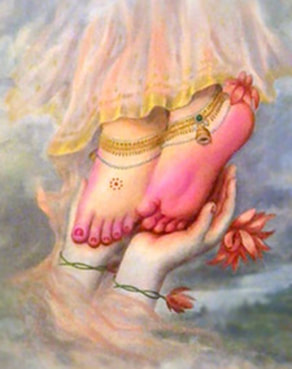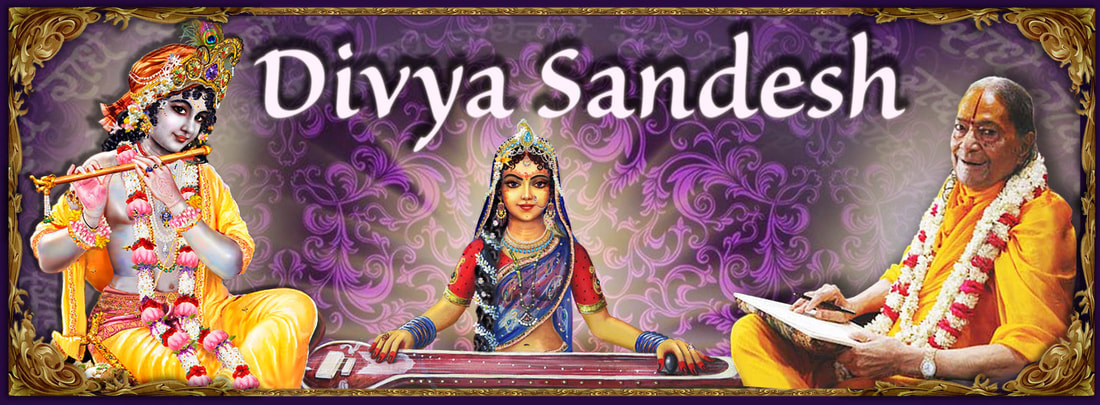|
Bhakti (भक्ति), which is translated most commonly as devotion, is the innermost divine power of God. It is the essence of divine love. The bliss of love is above all other kinds of divine bliss [1]. God's supreme power of bhakti is the goal. Also, the path to reach that goal is also bhakti. Veda Vyas reviewed the Vedas in great detail and ultimately declared that the essence of all the Vedas is Shri Krishna bhakti.
|
Creator Brahma also came to the same conclusion: Bhakti is the supreme path [2]. Unless the other paths - karma (कर्म), jñāna (ज्ञान) or yoga (योग) - are coupled with bhakti they cannot lead to God-realization. On the other hand, unaided by every other expedient, bhakti alone can lead to God realization [3].
By observance of path of Karma (actions) one gets more tangled in the web of karma aka has to bear the consequences of karma. Once these consequences have fructified, then both the karma and its consequence are exhausted. But karma are countless. So one cannot bear the fruits of those karma. So the path of Karma can enable us to realize God only if it is combined with selfless bhakti or devotion.
Jñāna (knowledge) removes ignorance and enables one to realize the existence of the soul or atma, but not the existence of God. The necessity of bhakti on the path of jñāna was pointed out by the greatest exponent of the path of jñāna, Adi Jagadguru Shankaracharya,
By observance of path of Karma (actions) one gets more tangled in the web of karma aka has to bear the consequences of karma. Once these consequences have fructified, then both the karma and its consequence are exhausted. But karma are countless. So one cannot bear the fruits of those karma. So the path of Karma can enable us to realize God only if it is combined with selfless bhakti or devotion.
Jñāna (knowledge) removes ignorance and enables one to realize the existence of the soul or atma, but not the existence of God. The necessity of bhakti on the path of jñāna was pointed out by the greatest exponent of the path of jñāna, Adi Jagadguru Shankaracharya,
|
शुद्धयति हि नान्तरात्मा कृष्णपदाम्भोज भक्तिमृते |
|
śuddhayati hi nāntarātmā kṛṣṇapadāmbhoja bhaktimṛte
|
"The mind is fully purified not by virtue of one's efforts in practicing jñāna, but through the grace one receives through bhakti or devotion to God. Thus, bhakti alone is the means to know God and it is also the final perfected goal of a devotee. The ultimate goal of an individual being is to attain divine bhakti [4], which will grant him selfless divine love, only then he would be allowed to serve God eternally".
Various acharyas of bhakti have propounded different definitions of the word bhakti. Some of those definitions of bhakti are:
The gist of all these descriptions is: Bhakti is total engrossment in the divine love-bliss of God. You can read a complete description of this philosophy in "Prem Ras Siddhant" (The Philosophy of Divine Love) by Jagadguru Shri Kripalu Ji Maharaj.
- भजनं भक्तिः (bhajanam bhakti) - Bhakti is the continuous loving remembrance of the names, forms, pastimes and attributes of the Lord [5];
- भागो भक्तिरिति (bhago bhaktiriti) - Bhag means "part". Bhakti is having the firm knowledge that “As a Jeev, my true identity is that I am a part of God”;
- भंजनम् भक्ति: (bhanjanaṃ bhaktiḥ) - Bhaṃjanaṃ means to burn away. Bhakti purifies the heart of a devotee by burning away the Panchkosh ( paṃca kośa पंचकोश), the gross and material sheaths that envelop the Jeev;
- भज्यते भक्तिरिति (bhajyate bhaktiriti) - Bhakti is the complete engrossment in sweet feelings of love for God [6];
- भज सेवायाम् (bhaja sevāyām) - Ved Vyas Ji explained the meaning as bhakti is formed from the Sanskrit root verb bhaja, which means seva (सेवा) or service. Hence the simple definition of bhakti is to serve God wholeheartedly [7].
The gist of all these descriptions is: Bhakti is total engrossment in the divine love-bliss of God. You can read a complete description of this philosophy in "Prem Ras Siddhant" (The Philosophy of Divine Love) by Jagadguru Shri Kripalu Ji Maharaj.





